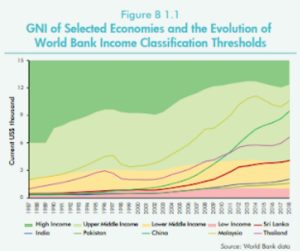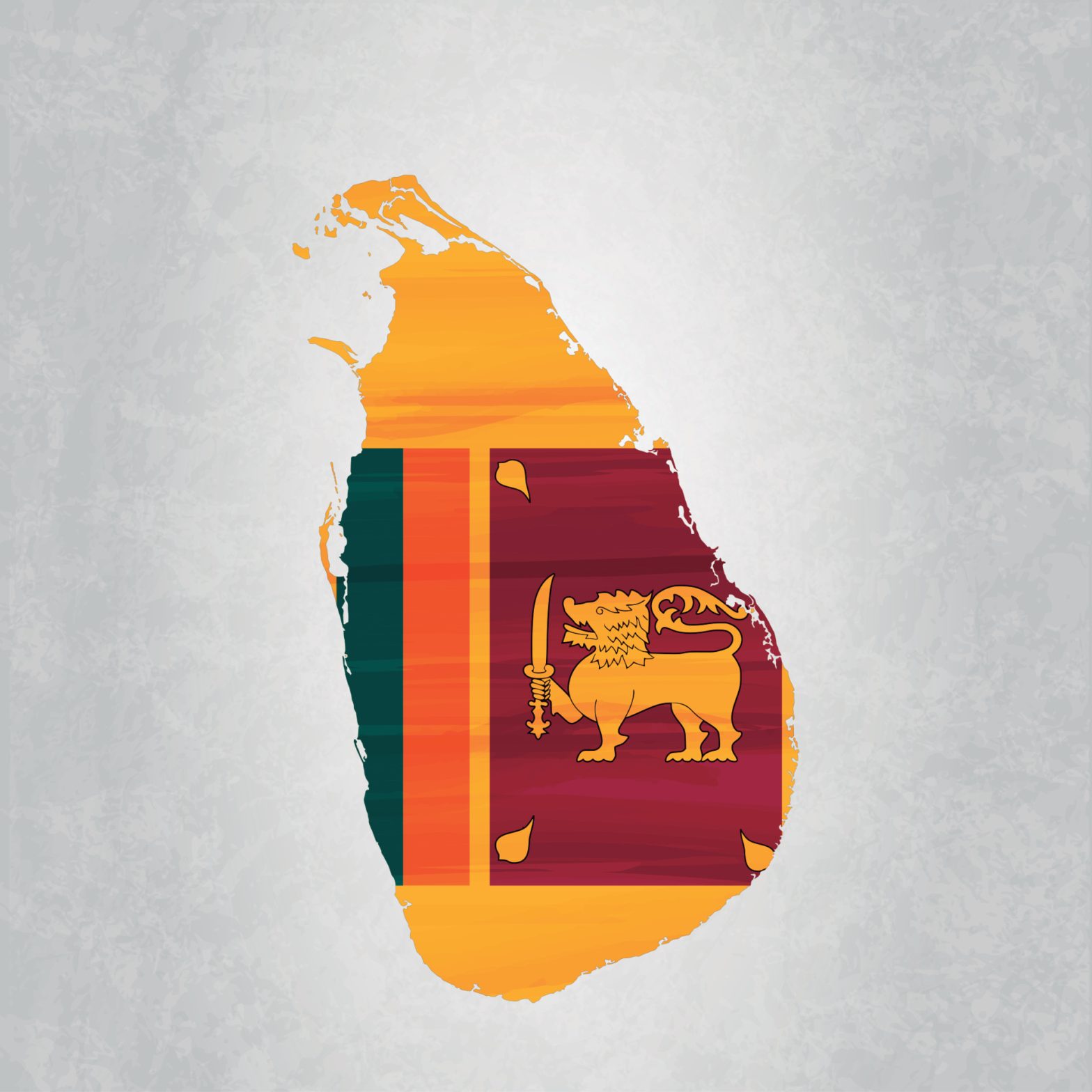SRI LANKA: QUESTIONS AND LESSONS
Obviously, we start: How and why has Sri Lanka fallen from the status of ‘middle-income country’ as classified by the World Bank in 2018? The fall occurred in a space of three years, within two years of Gotabaya Rajapaksa’s taking over the presidency with its vast executive powers.
The Origins of the Crisis
To my mind the media and pundits, by and large, with a few honorable exceptions, have failed to diagnose the predicament of the island nation. The media in general have repeated ad nauseum that Sri Lanka has been facing the “worst economic crisis since independence in 1948.” Accounting for the crisis, it has been said that Sri Lanka has been living beyond its means for decades and that the crisis was in the making for decades.
That argument does not add up to a full explanation of the genesis of the crisis.
Let us look at a World Bank graph:

In 1997 Sri Lanka, in World Bank’s reckoning, moved up from ‘low income’ to ‘lower middle income’, and in 2018 it moved higher to ‘upper income’. The World Bank assessment published in July 2019 expressed reasonable optimism about Sri Lanka’s further progress. However, in July 2021, the World Bank downgraded Sri Lanka to ‘lower middle income’.
Why? The only tenable explanation is Gotabaya Rajapaksa’s election as President in November 2019. In short, President Rajapaksa’s misgovernance and its disastrous impact on the economy compelled the World Bank to downgrade Sri Lanka and to send out red signals, signals that were willfully and culpably ignored by him.
I was Deputy High Commissioner for India from 1979 to 1982. I have seldom come across a better civil service in my numerous postings. Obviously, the political leadership was not making use of the civil service.
Why? Following Gotabaya’s victory in 2019, within two days he appointed elder brother Mahinda as Prime Minister. The SLPP (Sri Lanka People’s Party) of the Rajapaksa’s swept the polls and Mahinda continued as Prime Minister. In all there were 4 from the family in the government.
In short, the Sri Lankan voter replaced democracy with a brotherocracy, unwittingly or wittingly. Why and how? The Rajapaksas sailed to victory on a wave of fear and hatred. The majority Sinhala community was brainwashed into believing that the Tamils cannot be trusted and the LTTE (Lanka Tigers of Tamil Elam) might resurrect itself; and that the Muslims cannot be trusted and should be held in check, especially after the horrendous attack on Easter Day in 2019. In short, an ugly majoritarian agenda was presented to the gullible Sinhalese, and they bought it.
The Rajapaksa family held the major portfolios as defence, finance, economic policy& plan implementation, to name only a few. Inevitably, the brotherocracy created the economic crisis by hair-brained policies. For example, it was decided to switch over to organic farming overnight. Not because, the government wanted to promote organic farming. The real reason was that the treasury had no funds to import fertilizer. Agricultural production came down, and without foreign exchange to import shortages spread.
A key question arises. Could Gotabaya have applied course correction on time? Yes. Sri Lanka could have approached the IMF, before the economy collapsed. The Central Bank governor advised that course. Gotabaya rejected it on the flimsy ground that such a step would mean admitting openly that his policies were wrong.
Lord Acton said: Power corrupts, and absolute power corrupts absolutely. We may add a rider: Power isolates, and absolute power isolates itself absolutely.
The lesson to be learnt by the voter in Sri Lanka and elsewhere, wherever there is democracy, is that the voter should vote intelligently. In the 1932 general election, Hitler emerged as the head of the single largest party in the Parliament. In 2016 America voted Trump as president and he did his worst to succeed himself by resorting to mob violence to change the election results. Democracy implies an intelligent and vigilant electorate.
THE WAY FORWARD FOR SRI LANKA
Though Ranil Wickremasinghe has used or rather abused his executive powers by unleashing unnecessary violence on protesters who had announced their plan to leave the site in front of the presidential secretariat (15th July) and in other ways, I hold that it is in the best interest of Sri Lanka that the protests should be suspended. Wickremasinghe should be given the time to negotiate with the IMF, World Bank, Asian Development Bank, and friendly donor countries to put an end to shortages. This might take a month or two.
Once the shortages are ended, election for the parliament and presidency should be held as neither the president nor the parliament has legitimacy even though going by the letter of the law, they both hold positions legally. The full restoration of the economy will take years and only a government that is trusted by the people can accomplish that task if there is good will on the part of the international community.
Talking about good will, President Biden has signally failed to act. He has been generous to a fault in sending money to Ukraine. Is it the case that an Asian country does not count?
The G-20 meeting in Bali was futile as the West tried to embarrass Russia who walked out. That was an occasion for G20 to discuss the plight of Sri Lankan people. One wonders why India that has provided so much assistance to Sri Lanka did not think of bringing up the matter.
China’s behavior has been rather perplexing. Why has China chosen to be so unhelpful? We note that President Xi Jinping has sent a warm message to Wickremasinghe, and we need to carefully watch the next move by China. Will it agree to rescheduling of debt, a requirement for the IMF to agree to EFF (Extended Fund Facility)?
Meanwhile, there are reports of a research ship, Yuan Wang5, currently in the Indian Ocean, going to berth at Humbantota. Though Sri Lanka has officially denied the report, the official spokesperson of the Ministry of External Affairs has said that India would “ all necessary measures” to protect “ India’s security and economic interests.” Let us watch.
Sri Lanka’s Road ahead is rather rough. Apart from the political infirmities already pointed out, the debt stands at more than $51 billion, that works out to $2272 per head. Let contrast this figure with the per capita income of $3699 estimated for 2022, with an inflation rate of more than 50% in July 2022.
The point to emphasis is that the IMF will agree to EFF only if there is political stability, and it is confident that it is dealing with a government that is willing and able to implement clearly unpopular reforms including reducing or removing government subsidies on daily necessities. How can tourism revive if there is shortage of petrol? Even now it is not too late for Wickremesinghe to constitute an all-party government with a good dosage of eminent non-party individuals. Will he rise up to the occasion?
Featured image courtesy: Sri Lanka Flag Vectors by Vecteezy
